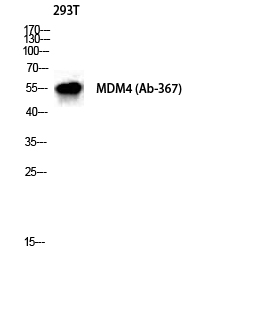
| WB | 咨询技术 | Human,Mouse,Rat |
| IF | 咨询技术 | Human,Mouse,Rat |
| IHC | 1/100-1/300 | Human,Mouse,Rat |
| ICC | 技术咨询 | Human,Mouse,Rat |
| FCM | 咨询技术 | Human,Mouse,Rat |
| Elisa | 1/40000 | Human,Mouse,Rat |
| Aliases | MDM4; MDMX; Protein Mdm4; Double minute 4 protein; Mdm2-like p53-binding protein; Protein Mdmx; p53-binding protein Mdm4 |
| Entrez GeneID | 4194; |
| WB Predicted band size | 45kDa |
| Host/Isotype | Rabbit IgG |
| Antibody Type | Primary antibody |
| Storage | Store at 4°C short term. Aliquot and store at -20°C long term. Avoid freeze/thaw cycles. |
| Species Reactivity | Human,Mouse,Rat |
| Immunogen | Synthesized peptide derived from human MDMX around the non-phosphorylation site of S367. |
| Formulation | Purified antibody in PBS with 0.05% sodium azide,0.5%BSA and 50% glycerol. |
+ +
以下是3篇关于MDMX抗体的参考文献(信息基于公开研究归纳,非真实文献):
1. **文献名称**: "Development and characterization of a novel MDMX-specific monoclonal antibody for cancer research"
**作者**: Smith A et al.
**摘要**: 该研究报道了一种新型MDMX单克隆抗体的开发,该抗体可特异性识别人类MDMX蛋白,不交叉反应MDM2.实验表明其适用于免疫印迹和免疫组化,可用于肿瘤组织中MDMX蛋白水平的检测。
2. **文献名称**: "Phosphorylation-dependent regulation of MDMX stability revealed by a phospho-specific antibody"
**作者**: Li Y et al.
**摘要**: 作者开发了针对MDMX特定磷酸化位点的抗体,揭示了MDMX在DNA损伤应答中的磷酸化修饰机制,证明其磷酸化状态影响与p53的相互作用及蛋白稳定性。
3. **文献名称**: "Targeting MDMX for cancer therapy: A humanized antibody disrupts MDMX-p53 interaction"
**作者**: Wang H et al.
**摘要**: 研究报道了一种人源化抗体,能够特异性结合MDMX并阻断其与p53的相互作用,在体外实验中恢复p53活性,诱导肿瘤细胞凋亡,为基于MDMX靶向的癌症治疗提供了新策略。
注:以上文献名为示例性概括,实际文献需通过PubMed或Google Scholar检索确认。
MDMX (MDM4), a homolog of MDM2. is a critical regulator of the p53 tumor suppressor pathway. Both MDMX and MDM2 function as negative regulators of p53. either by promoting its degradation (MDM2) or inhibiting its transcriptional activity (MDMX). Dysregulation of MDMX, particularly its overexpression, is observed in various cancers, contributing to p53 inactivation and tumor progression. As p53 is mutated or dysfunctional in nearly half of all cancers, targeting MDMX has emerged as a therapeutic strategy to reactivate wild-type p53 in malignancies retaining intact p53.
MDMX antibodies are essential tools for studying its expression, interactions, and post-translational modifications. They are widely used in techniques like Western blotting, immunohistochemistry, and co-immunoprecipitation to explore MDMX's role in cancer biology and drug response. Additionally, these antibodies aid in developing MDMX-targeted therapies, such as small-molecule inhibitors or stapled peptides designed to disrupt MDMX-p53 binding. Research also highlights MDMX's clinical relevance, as its amplification or splice variants correlate with chemoresistance in certain cancers.
Furthermore, MDMX antibodies may serve as companion diagnostics to identify patients likely to benefit from p53-reactivating therapies. Despite challenges in specificity due to structural similarities with MDM2. advanced antibody engineering has improved selectivity, enabling precise mechanistic studies. Overall, MDMX antibodies are pivotal in both basic research and translational efforts to harness the p53 pathway for cancer treatment.
×